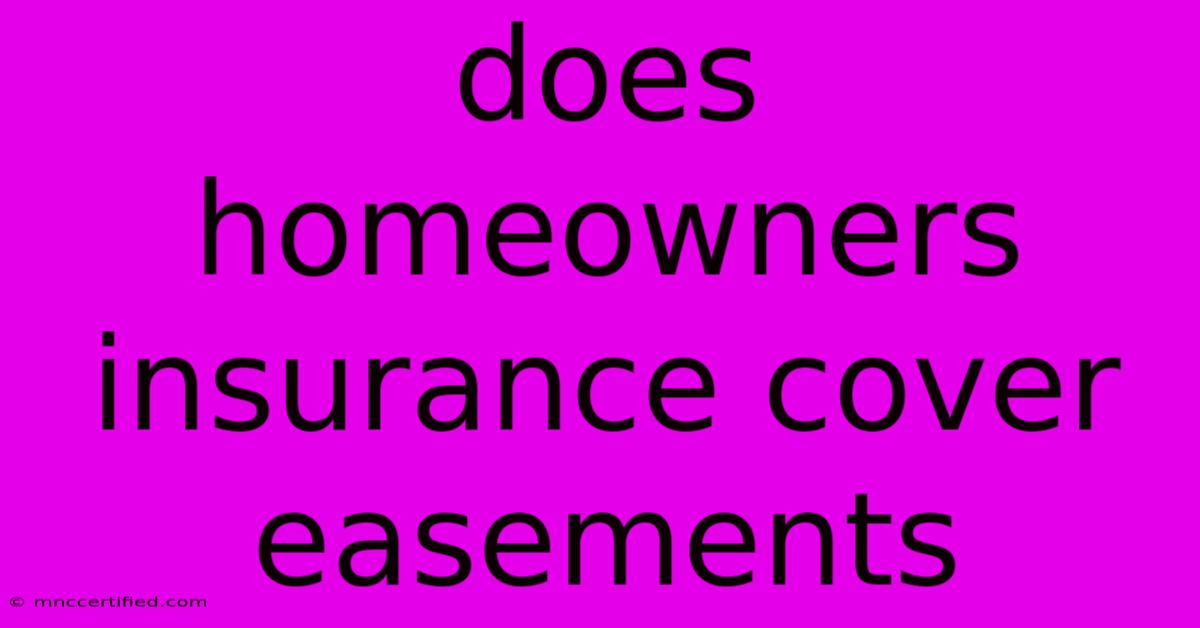Does Homeowners Insurance Cover Easements

Table of Contents
Does Homeowners Insurance Cover Easements? Unraveling the Complexities
Owning a home is a significant investment, and protecting that investment with homeowners insurance is essential. But what about those legal rights that often accompany property ownership – easements? Does homeowners insurance cover damages that occur on an easement, or does it leave you exposed? Let's dive into the intricacies of easements and homeowners insurance to get clarity.
Understanding Easements: What They Are and Why They Matter
An easement is a legal right that allows someone other than the property owner to use a portion of the land for a specific purpose. Common examples include:
- Utility Easements: Allowing utility companies to access lines for electricity, gas, or water.
- Access Easements: Providing a neighbor or another party the right to cross your property to reach their own.
- Drainage Easements: Permitting water flow from a neighboring property across yours.
While easements may seem like a minor detail, they can become significant when it comes to insurance coverage.
The Complexities of Coverage: When Homeowners Insurance Does and Doesn't Apply
Here's where things get tricky. Homeowners insurance typically covers damages to your property, including your house, outbuildings, and personal belongings. However, the coverage extends to the easement area only under specific circumstances.
Here's a breakdown:
Covered Scenarios:
- Damage to your property caused by an easement: If a utility company accidentally damages your fence while accessing their lines within an easement, your homeowners insurance likely covers the repairs.
- Liability for injuries on your property: If someone gets hurt on your property while accessing an easement, your liability coverage might come into play.
Uncovered Scenarios:
- Damages to the easement itself: Your insurance usually doesn't cover damages to the easement itself, such as a collapsed utility line or a damaged road within the easement. This is because you don't own the easement, and the responsibility for maintenance often lies with the easement holder.
- Pre-existing easement issues: If the easement was already damaged before you bought the property, your homeowners insurance won't cover repairs for a pre-existing condition.
Key Takeaways: Protecting Your Interests
- Read your policy carefully: Understand the terms and conditions related to easements and liability coverage.
- Communicate with easement holders: Maintain open communication with utility companies or other easement holders to ensure they are aware of any potential issues.
- Consider additional coverage: Depending on the nature of your easement, explore options for additional coverage, such as specific liability insurance or policies tailored to utility easement risks.
- Seek professional guidance: Consult with your insurance agent or a legal professional for personalized advice about your situation.
Navigating the Grey Areas: Seeking Clarity
The relationship between easements and homeowners insurance can be complex. Remember, each situation is unique. By thoroughly understanding your policy, communicating clearly with easement holders, and seeking professional advice when necessary, you can navigate these complexities and ensure your home and investment are adequately protected.

Thank you for visiting our website wich cover about Does Homeowners Insurance Cover Easements. We hope the information provided has been useful to you. Feel free to contact us if you have any questions or need further assistance. See you next time and dont miss to bookmark.
Featured Posts
-
Was Ivanka Trump At Trumps Win Party
Nov 07, 2024
-
Gary Barlows Son Tall And Trending
Nov 07, 2024
-
Insurance Company Not Responding To Claim
Nov 07, 2024
-
Donald Trump Bitcoin Price Impact
Nov 07, 2024
-
Lurie In Front In San Francisco Mayoral Election
Nov 07, 2024